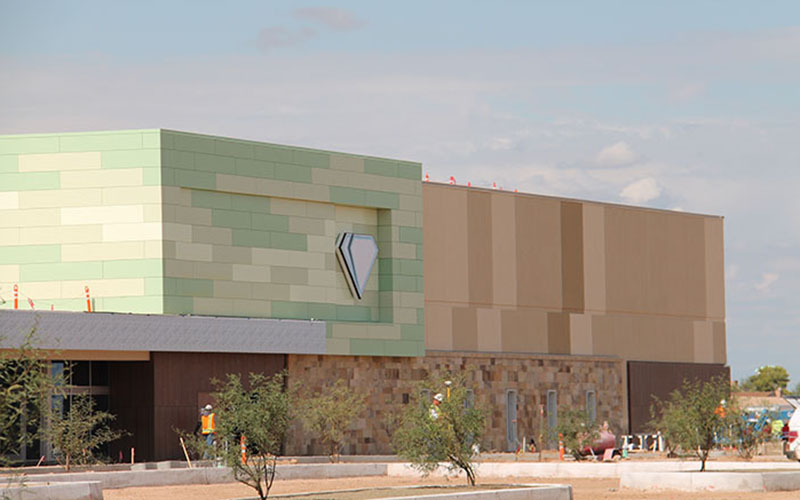
The Tohono O’odham Nation acquired 135 acres in Glendale that converted to reservation land, where the tribe in 2015 opened the Desert Diamond-West Valley resort and casino. The tribe and state officials announced a settlement of long-running legal and legislative fights to block the casino.
(Photo by Megan Siquieros/Desert Diamond)
WASHINGTON – State and tribal officials announced a settlement Wednesday of a long-running fight against the Tohono O’odham’s Desert Diamond Casino West Valley, which survived years of legal and legislative challenges before opening in 2015.
Under the deal, the state will not block liquor or Class III “Las Vegas-style” gaming licenses for the tribe’s casino in Glendale. In exchange, the Tohono O’odham agree not to operate any other gaming facilities in the metro Phoenix area.
Gov. Doug Ducey said it is “time to move forward” on modernizing the state’s gaming compact with tribes and the settlement will allow that to happen while ensuring there is no further casino expansion.
“This agreement is a major victory for Arizona, one that ensures that there are meaningful restrictions on additional casinos in the greater-Phoenix-metro area,” Ducey said in a statement released by his office.
Tohono O’odham Chairman Edward Manuel said the settlement marks “a day the nation has long been working toward.”
“The nation is eager to continue with its West Valley investment to create thousands of new jobs, positive economic development, and a world-class casino resort that all of Arizona can be proud of,” Manuel said in a prepared statement.
The roots of the dispute stretch back to the 1960s when a federal dam on the Gila River flooded thousands of acres of land on the Tohono O’odham reservation in southern Arizona. The government eventually agreed to compensate the tribe, allocating $30 million for the Tohono O’odham to buy to replace the flooded property.
The tribe used some of that money in 2003 to buy 135 acres of land on a “county island” in the middle of Glendale – unincorporated property surrounded by incorporated sections of the city and not subject to city oversight.
In 2009, the federal government took the land into trust for the Tohono O’odham, which made it part of the tribe’s reservation, even though Glendale and the nation are separated by more than 100 miles.
When the tribe announced plans to build a casino on the new portion of its reservation, it sparked a flurry of opposition from nearby residents, lawmakers and rival tribes.
But legal challenges, from Gila River and Salt River Pima-Maricopa Indian communities and from local and federal lawmakers, were repeatedly turned back by the courts. Several legislative attempts to stall or overturn the deal also failed.
The most recent legislative attempts came in the last Congress. A bill by Rep. Trent Franks, R-Glendale, to prohibit casinos on land like the Glendale site, failed in late 2015 to get the two-thirds vote needed to pass through the House as an emergency bill.
A companion bill sponsored by Sen. John McCain, R-Arizona, died without a vote in the Senate.
Franks’ office did not immediately respond to a request for comment on the settlement. McCain said he is still opposed to the way the casino deal played out, but he hoped the settlement could lead to healing between the tribes that had been fighting for years over the project.
“While I continue to oppose the air-dropping of Indian casinos on land that is not contiguous to an existing reservation, the agreement reached by Gov. Ducey and the Tohono O’odham tribe brings to an end years of prolonged litigation over this issue and eliminates the need for federal legislation,” McCain said in a prepared statement.
Ducey’s announcement said that restrictions in the settlement would terminate if state or federal law was enacted blocking the Glendale casino or if other tribes opened new casinos in the area.
The agreement lets the tribe continue to buy land to replace property lost in the Gila River flooding, with the stipulation that the Tohono O’odham will not ask for it to be taken into trust for the purpose of gaming in the area.
Rep. Raul Grijalva, D-Tucson, long a supporter of the project, said the settlement was past due.
“The Tohono O’odham Nation has prevailed in court and Congress,” Grijalva said in a statement released by his office. “This agreement guarantees for the foreseeable future that no more money and time is wasted on futile litigation efforts.”